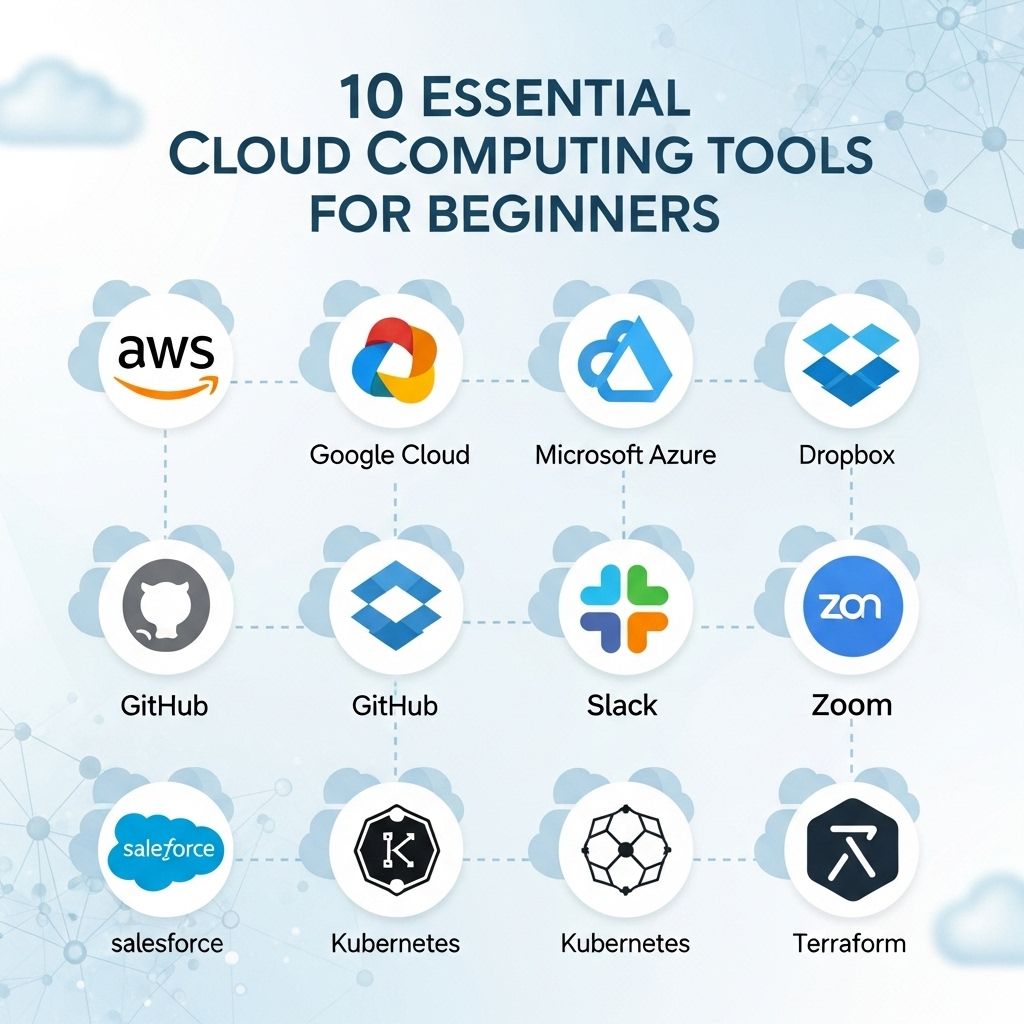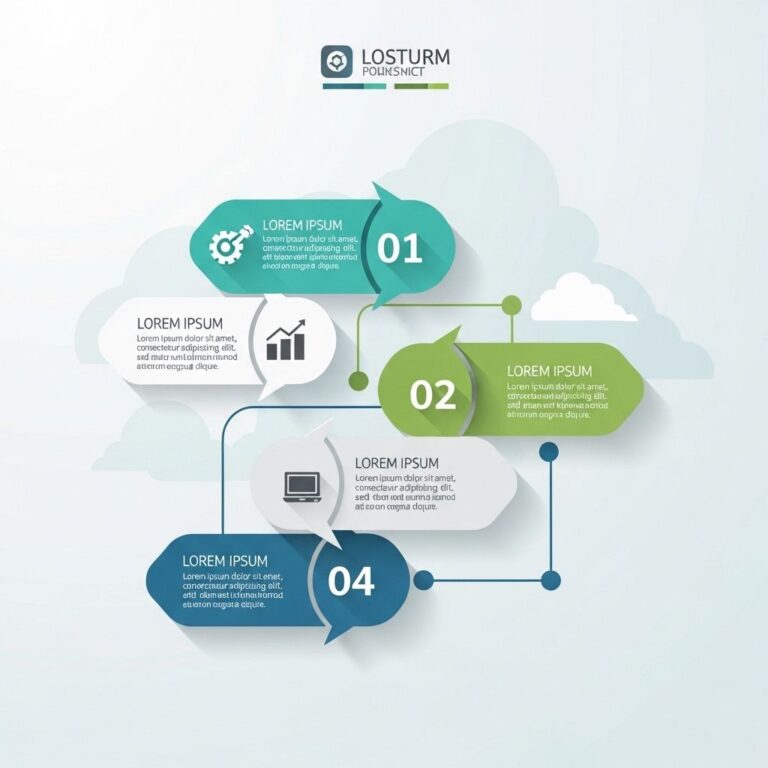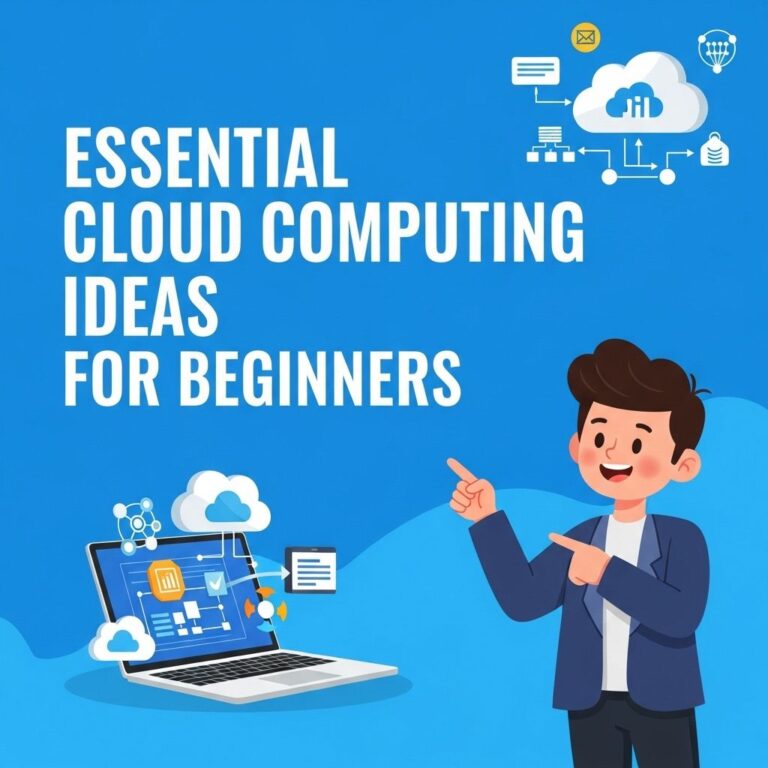In the rapidly evolving world of technology, cloud computing has emerged as a fundamental element for businesses and individuals alike. For beginners venturing into this domain, navigating through the myriad of tools available can be overwhelming. This article aims to outline ten essential cloud computing tools that not only simplify the learning process but also enhance productivity and efficiency. Whether you’re looking to streamline operations, collaborate with teams, or store data securely, understanding these tools can set a solid foundation for your cloud computing journey.
Table of Contents
1. Amazon Web Services (AWS)
Amazon Web Services is a comprehensive cloud computing platform that offers a range of services including computing power, storage options, and networking. AWS is ideal for beginners because:
- It has an extensive learning library and resources.
- You can start with a free tier to understand the basics.
- It offers scalability to grow with your needs.
Key Features of AWS
- EC2 for virtual servers
- S3 for storage
- RDS for databases
- Lambda for serverless computing
2. Google Cloud Platform (GCP)
Google Cloud Platform provides a suite of cloud services that run on the same infrastructure that Google uses internally for its end-user products. GCP is beginner-friendly due to:
- A user-friendly interface
- Several free-tier options
- Strong support for machine learning and data analytics
Key Features of GCP
- BigQuery for data analytics
- Cloud Functions for event-driven serverless computing
- App Engine for building web applications
- Cloud Storage for file storage
3. Microsoft Azure
Microsoft Azure is another leading cloud platform that offers a wide array of services. It’s especially beneficial for beginners familiar with Microsoft products. Benefits include:
- Integration with Microsoft software
- A rich library of resources to learn from
- Strong enterprise-level security
Key Features of Azure
- Azure DevOps for project management
- Azure Functions for serverless computing
- Blob Storage for unstructured data
- Virtual Machines for hosting applications
4. DigitalOcean
DigitalOcean is known for its simplicity and user-friendly interface, making it an excellent choice for beginners. It offers:
- Simple pricing models
- A straightforward setup process
- A community forum rich with tutorials
Key Features of DigitalOcean
- Droplets for cloud servers
- Kubernetes for container orchestration
- Spaces for object storage
- App Platform for deploying applications directly
5. Heroku
Heroku is a platform as a service (PaaS) that enables developers to build, run, and operate applications entirely in the cloud. It is particularly beneficial for beginners due to:
- Simplicity in deployment
- Support for multiple programming languages
- A marketplace with a variety of add-ons
Key Features of Heroku
- Dynos for scaling applications
- Heroku Connect for integrating Salesforce data
- Easy collaboration features
- Real-time monitoring tools
6. Dropbox
Dropbox is a file hosting service that offers cloud storage, file synchronization, and personal cloud capabilities. It’s ideal for beginners needing:
- Simplicity in file sharing
- Synchronization across devices
- Collaboration tools
Key Features of Dropbox
- File recovery and versioning
- Smart Sync for managing storage
- Paper for collaborative documents
- Integrations with numerous applications
7. Slack
Slack is a collaboration tool that brings teams together in one place, making it easier to communicate and collaborate effectively. For beginners, it offers:
- Easy-to-use interface
- Integrations with other cloud services
- Real-time messaging and file sharing
Key Features of Slack
- Channels for topic-based discussion
- Direct messaging for private conversations
- Threaded conversations for organized discussions
- Search functionality for easy information retrieval
8. Google Workspace
Google Workspace provides a suite of productivity and collaboration tools, including Google Drive, Docs, Sheets, and more. It’s advantageous for beginners because:
- Familiar user interface
- Real-time collaboration
- Cloud storage capabilities
Key Features of Google Workspace
- Drive for file storage
- Docs for document editing
- Sheets for spreadsheets
- Gmail for communication
9. Trello
Trello is an intuitive project management tool that uses boards, lists, and cards to organize tasks. This tool is perfect for beginners looking to manage projects effectively. Advantages include:
- Visual project tracking
- Flexibility in organizing tasks
- Simple collaboration features
Key Features of Trello
- Customizable boards and cards
- Due dates and reminders
- Integration with other apps
- Power-Ups to enhance functionality
10. Notion
Notion is a versatile tool that combines note-taking, task management, and project organization into a single platform. For beginners, it provides:
- Customizable templates for various purposes
- Collaboration features for team projects
- Integration with multiple apps
Key Features of Notion
- Databases for structured information
- Wiki-style pages for documentation
- Task lists for project management
- Real-time collaboration features
Conclusion
Embarking on your cloud computing journey can be daunting, but with the right tools at your disposal, you can accelerate your learning and improve your productivity. The ten tools highlighted above are not only beginner-friendly but also serve as a robust foundation for exploring more advanced cloud concepts and applications. By leveraging these tools, you can enhance your skills and harness the full potential of cloud computing in today’s digital landscape.
FAQ
What are the top cloud computing tools for beginners?
Some of the top cloud computing tools for beginners include AWS Free Tier, Microsoft Azure, Google Cloud Platform, Dropbox, and Trello.
How do I choose the right cloud computing tool?
Choosing the right cloud computing tool depends on your specific needs, such as storage capacity, ease of use, integration options, and budget.
Are there free cloud computing tools available?
Yes, many cloud computing tools offer free tiers or trial versions, such as AWS Free Tier, Google Cloud’s free credits, and Microsoft Azure’s free account.
What is the importance of cloud computing tools for beginners?
Cloud computing tools are essential for beginners as they provide scalable resources, facilitate collaboration, and allow for the effective management of data and applications.
Can cloud computing tools help with project management?
Yes, cloud computing tools like Trello and Asana are specifically designed to enhance project management by enabling teams to collaborate and track progress online.
What skills do I need to start using cloud computing tools?
To start using cloud computing tools, beginners should have basic knowledge of cloud concepts, familiarity with software applications, and an understanding of data management.









